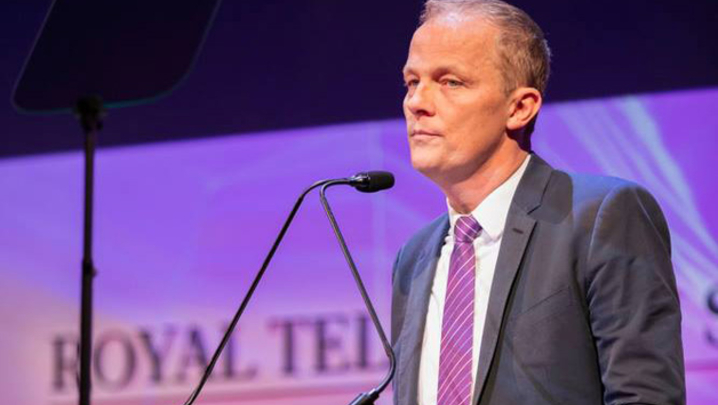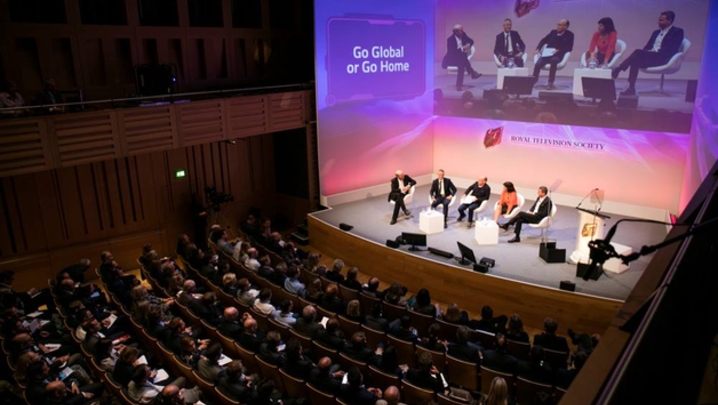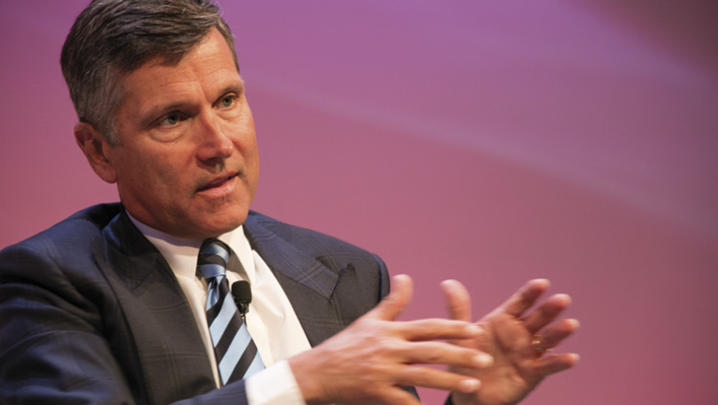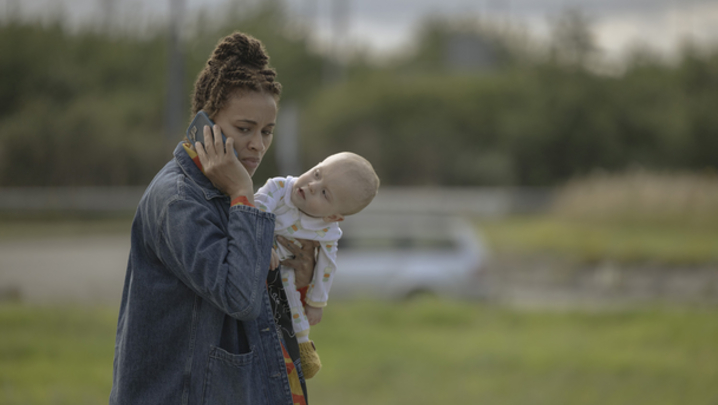Kevin MacLellan runs NBCU International. He talks to Steve Clarke about Brexit, Netflix and rising out of his working class roots.
The Chair of this year’s RTS London Conference, Kevin MacLellan, the London-based Chairman of International at NBCUniversal, is proof that talent and hard work, rather than privilege and well-placed connections, can take you to the top of the entertainment industry.
His blue-collar Brooklyn background was about as far as you could get from Hollywood or downtown Manhattan. MacLellan’s family expected him to follow in his father’s footsteps: they wanted him to work for the local phone company. He saw his future differently.
“My parents told me that I was nuts when I gave them the news that I’d got a job as a freelance production assistant working on music videos,” he recalls. “They looked at me as if I had six heads. My mum was very annoyed with me… all that money that had been spent on a college education. She wanted me to take the job my father’s friends had arranged for me at the phone company.”
More than 25 years later, MacLellan runs NBCU’s billowing international business. The job encompasses overseeing growth from TV channels, movie distribution, TV production and a library of more than 75,000 TV episodes plus news and theme parks.
He is a Comcast veteran, under whose leadership Comcast (the US cable behemoth that bought NBCU from General Electric in 2011) famously increased its international channel subscribers from 17 million to more than 100 million and grew syndication revenue by over 500%.
His previous jobs include working for HBO in Prague (in charge of the pay-TV outfit’s central and eastern European programming group) and Sony Pictures Television International. Based in London, MacLellan was Vice-President of Sony’s International TV Networks business.
NBCU’s international division spans 36 countries (including the UK) and is a key area for growth at the entertainment giant. He was appointed Chair of International three years ago.
“As humans, we are pack animals. We crave shared experiences."
MacLellan looks conspicuously casual and his youthful demeanour may come from being a relatively new parent. He is dressed in off-white chinos and a summer-weight check shirt, open at the neck, finished off with elegant, suede Chelsea boots. With closely cropped hair and Nordic blue eyes, MacLellan looks more like an off-duty, all-American sports coach enjoying a summer weekend than a media executive at the end of a tiring week.
That is until he starts talking. “I aim to leave in time to be home at 6:30pm to feed and put our 14-month-old twins to bed. But this week I was out three nights out of four and I’m out again tonight,” he says ruefully.
MacLellan’s manner is direct and upbeat. And so it should be. A couple of days before this interview, Variety had published another positive story about NBCU’s US business. Steve Burke, the company’s CEO, told the paper that advertising dollars were returning to TV after a long period of experimenting with social media and digital.
MacLellan was not surprised. He is convinced that the future of traditional advertiser-funded linear TV is secure.
“Listen, I’ve never been a naysayer on linear,” he says. “I think linear is going to be around for a very long time. I believe there is a place for it that OTT can’t replace.”
He adds: “My belief is that free-to-air broadcast will continue to be popular and money will continue to move into it.
“As humans, we are pack animals. We crave shared experiences. I do believe that it is linear TV that will continue to deliver those shared experiences in a large way.”
NBCU’s financial results are reported within Comcast’s and the contribution made by International is not separated out. In common with other global US entertainment businesses, it is International that is growing faster than the domestic activities.
MacLellan says: “The US advertising market being so buoyant and the pay-TV market there being so large means that there’s a long hill to climb before you get to the point where international outweighs domestic revenues. But in 10 years’ time.…
“For us, there is growth all over the place.” He identifies the UK, Germany, Australia, Latin America and France as key growth markets. “We like to say: ‘We build scale where scale matters.’”
He continues: “Obviously, China and India are big growth markets. There’s less affinity to our content but certainly there’s large GDP growth in those particular markets and you’re seeing a large move to the middle class.
“People didn’t use to be able to afford the kind of products and services that we provide.”
For many years, Chinese and Indians have consumed a huge amount of TV and film, MacLellan points out. The challenge for companies such as NBCU has been that most viewers have tended to ignore Western-style content – they have generally tuned in to local-language stations. This is changing, now, as young people watch video on their mobile phones. “We are seeing much more of an affinity for English-language content over the phone with young people in those markets. This is great news for us,” he says.
Turning to the UK, he points out that NBCU was one of the first US studios to acquire a British producer, Carnival, in 2008. The company became famous for making a certain English country-house drama that became a global phenomenon. But how do you find the next Downton Abbey?
“If I knew that, I’d be writing dramas. Listen, you just try and work with the best talent,” says MacLellan. “My experience has been that talent is probably the rarest commodity out there – that is, true, creative talent.
“There are lots of discussions about how people make a lot of money or are treated incredibly well. That’s because there are so few of them.
“It’s basic economics. There are so few that they are worth more. Since we got here, our goals in the UK have been to work with the best of the best.
“Gareth Neame at Carnival has done a phenomenal job,” MacLellan adds. “We’re very proud of that label. It’s produced one of the highest-rated dramas in the UK in the past 20 or 30 years. It’s had more Emmy nominations and awards than any other drama in its history.
“When you’re working with people that good you will find another Downton Abbey. But there is no exact way into it… you work with the best, support them and make this a place where they wanna be.”
If securing hit shows is always a high-wire act, having access to NBCU’s massive distribution network mitigates the risk considerably.
“To be in the production business as a standalone is not a great business,” he explains. “But to be in the production business when you’re working with a distribution business the size of ours makes a lot of sense.”
Including Carnival, NBCU owns five UK producers. The others are Monkey Kingdom, Chocolate Media, Telecopter TV and Lucky Giant.
Is NBCU considering acquiring other UK independents? “Yes,” he confirms. “A lot have been bought. There are not a whole lot out there. We do not have a philosophy that more is better. It is more about quality than quantity. It is not about volume of hours.
“The idea of buying a big All3Media is not really something that is part of our strategy. Our focus is to work with the best of the best in Britain.
“So, if there was a great British writer or director or producer who had their own production entity, we would certainly be interested in working with them.
“From that perspective, we would potentially acquire or fund the start-up of a new production company.”
Last year, NBCU announced a joint venture with film producer David Heyman, Heyday Television. The initiative followed Heyman producing BBC Two’s classy The Worricker Trilogy, made with Carnival and written by David Hare.
It has been widely reported that NBCU has considered making a bid for ITV. MacLellan insists that “none of the stories that appeared were true”.
Might it happen one day? “There’s a possibility that we make an investment. At this point, there is no plan to make one,” he says.
NBCU’s strategy in the UK involves continuing “to develop the best possible English-language content and distributing that around the world”.
MacLellan explains: “A big part of why we’re here, and one of the advantages of having our own office here, is mining the talent that exists in the UK so that we can move that product over to the US. That’s the home run for us.”
MacLellan on… Brexit
Q Following Brexit, might NBCU move its international HQ from London to Paris or Frankfurt?
A I should never say no to anything but, right now, that’s certainly not the plan. Our CEO felt that you go where the money is – and the money is still primarily in western Europe. The obvious place to go was London.
From a trade perspective, the product that we distribute from this office wouldn’t be so heavily affected [by Brexit] that we’d have a reason to leave the UK. At least as things are now.…Probably the biggest thing that would decide whether we leave or not would be the brain drain.
More than 100 of our London-based employees are non-British nationals. Most of them work at senior levels. If they were forced to move or we weren’t able to get visas, that would be a moment to pause for thought.
What London has right now is the best of the best. You get to pool the best talent from different countries. If you close your borders to that you will see companies such as ours starting to see if there is someplace else we should work from.
Kevin MacLellan, Chairman of NBCUniversal International, is also Chair of the RTS London Conference on 27 September.
MacLellan on… Netflix
Q What is your take on Netflix?
A Netflix has been a revolutionary delivery platform that has performed very well because it has a great service. It took a very complicated concept and made it quite simple to follow.
Its interface, which, interestingly, looks a little old compared with some new entrants, was groundbreaking when it started. It was simple and intuitive. Add to that, a reliable technical streaming service.
Let me tell you that, having launched these services ourselves, we’ve realised how difficult that is behind the scenes [NBCU launched reality streaming service hayu in the UK this spring].
The fact that Netflix was able to do it on the scale that it did, reliably and intuitively, and then to add all the content, was incredibly admirable.
We’ve learned a lot from [how it did that]. The way consumers will interact with a product like that has really set the path for the rest of us.






